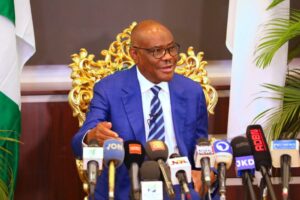In September 2024, the Nigerian government announced a new minimum wage of N70,000 for civil servants, along with plans to pay arrears dating back to July and August. At first glance, this seemed like a victory for workers who have long called for higher wages to cope with the rising cost of living. But many Nigerians were quick to realize that the wage hike did little to improve their financial situations, especially with the skyrocketing cost of electricity.
A recent report shows that minimum wage earners are now spending an alarming 57.3% of their monthly salaries on electricity bills alone, even when using just seven basic household appliances. For these workers, the wage increase feels almost irrelevant in the face of soaring living costs. The electricity tariff hike is one of the primary reasons for this hardship.
The Drastic Rise in Electricity Tariffs
The Nigerian Electricity Regulatory Commission (NERC) announced a 300% increase in electricity tariffs in April 2024, affecting users in the Band A and B service categories. Previously, the rate was N66 per kilowatt-hour, but it jumped to N225, causing widespread financial strain on households.
At the time of the announcement, NERC claimed that only 15% of customers would be impacted by this change, primarily those receiving the highest quality of electricity service (over 20 hours of electricity per day). However, within months, many Nigerians reported being moved to the more expensive Band A without warning or consent. This surprise transfer has left people facing bills that have more than tripled in cost.
Joe Abah, a financial expert, shared his frustration on social media, stating that his N100,000 electricity payment now lasts only seven days, after his sudden move to Band A. Many Nigerians echo similar experiences, with some now choosing to live in darkness for parts of the month just to save on electricity costs.
For many low-income earners, the new minimum wage of N70,000 offers little relief. The reality is that more than half of this income is now swallowed up by electricity bills, leaving them struggling to cover other essential needs like food, healthcare, and school fees for their children.
Ayodele Dipo, a civil servant in Lagos, described how his electricity costs have skyrocketed since being moved to Band A. “Before, I could buy N5,000 worth of electricity credit, and it would last two to three months. Now, that same amount barely lasts a week. I’ve had to buy N5,000 of credit three times in the past 20 days, which is just draining my salary.”
This story is all too common among Nigeria’s low-income workers. Kenneth Enobong, a security guard in Lagos, explains that he now has to prioritize basic necessities over electricity, often choosing to live without power for days at a time. “We need to feed our families and pay school fees. Health needs can’t wait. So, electricity bills come last. We can’t afford it all.”
Small business owners are also feeling the pressure. Chidi Adum, who runs a modest business, expressed his frustration over being moved to Band A without any notice. His electricity bills have more than doubled, making it difficult to keep his business running smoothly. “They want us to pay these ridiculous tariffs, but we weren’t even given a choice or notice about it. How are we supposed to cope?”
The high cost of electricity is just one part of the financial burden Nigerian workers face. Fuel costs, transportation, and the general cost of living have all increased significantly in recent years, and the wage increase does little to offset these growing expenses.
Dr. Pogu Bitrus, a leader of the Middle Belt Forum, voiced concerns about how the rising cost of energy is eroding the earnings of all Nigerians, not just minimum wage earners. “Whether it’s electricity, petrol, or transportation, energy is taking a huge portion of our incomes. The civil servants who received the wage increase are just a fraction of the population, but everyone is suffering.”
He called on the government to review its energy policies, including the electricity tariff hike, to ease the burden on Nigerians. “The government cannot continue to give with one hand and take away with the other. While the wage increase is meant to help workers, the steep rise in electricity costs is undoing that progress. We need policies that support nation-building without impoverishing people.
It’s not just households that are struggling with the increased cost of electricity. Businesses across Nigeria are also feeling the impact, with many forced to cut back on energy usage to manage their bills. Kevin Abayomi, an electrical engineer in Lagos, revealed that his company’s monthly electricity bill had jumped from N90,000 to a staggering N500,000 after being moved to Band A.
This massive increase has prompted his company to introduce strict energy-saving measures. “Our HR manager told us that we must turn off all appliances at the end of the workday to save costs. The electricity bills are simply too high to keep up with at this rate.”
These high costs are putting pressure on businesses to reduce operations or pass the increased costs on to consumers, further raising the cost of goods and services in the country.
As Nigerians continue to grapple with the financial strain of rising electricity bills, calls for government intervention are growing louder. Many feel that the government’s energy policies are placing an unfair burden on citizens, particularly low-income earners. The recent wage increase, while welcome, has been overshadowed by the sharp rise in living costs, leaving workers worse off than before.
Nigerians are urging the government to take immediate action to reverse the electricity tariff hike and implement policies that provide real relief to struggling households. Without such measures, the gap between wages and the cost of living will continue to widen, making it even harder for the country’s most vulnerable workers to make ends meet.







